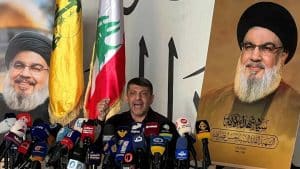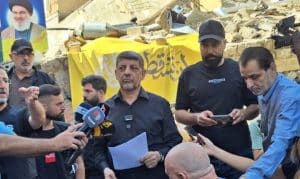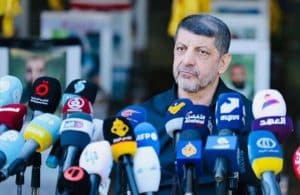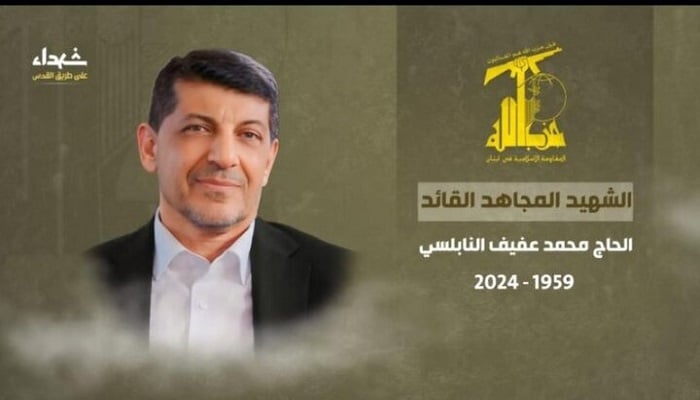PNN – The media activities of martyr Mohammad Afif Al-Nabulsi played a significant role in advancing Hezbollah’s psychological warfare against the Zionist regime.
Martyr Muhammad Afif Al-Nabulsi was one of the standard-bearers of Hezbollah’s media jihad in Lebanon. He was nicknamed Haj Muhammad Afif, and was one of the resistance’s media commanders from the first stages of the battle against the Zionist enemy in 1982, and one of the founders of Hezbollah’s media system.
Considered to be from the generation of Hezbollah’s founders in Lebanon, he began his media career in the party in 1982. He wrote the first statement about the martyrdom operation of Ahmed Qusayr on November 11, 1982, on the side of a road.
Martyr Afif was a close friend of Seyyed Abbas Mousavi and Seyyed Hassan Nasrallah.
Martyr Afif had close ties to Martyr Seyyed Abbas Mousavi and Martyr Seyyed Hassan Nasrallah, former Secretaries-General of Lebanese Hezbollah.
Read more:
A corner of Martyr Afif’s media jihad in the resistance front
Afif was the director of news and political programming for Hezbollah’s Al-Manar network. The Independent wrote that Afif’s role in Operation Storm al-Aqsa was highlighted when he gave press conferences from the heart of Beirut’s southern suburbs, discussing the situation on the ground and insisting that the party was winning the war.
It was this powerful role that prompted the Zionist regime to assassinate this Hezbollah media official, contrary to international standards, who had no role in the field conflicts and was considered a completely civilian and media person, and whose activities and movements were not confidential.

Sheikh Sadiq Al-Nabulsi, brother of martyr Muhammad Afif, said at the funeral of this great martyr that martyr Muhammad was always in the heart of the battle and knew that he was in a fierce confrontation. He abandoned all worldly concerns and took up arms to confront the enemy.
Deputy of Martyr Nasrallah in managing the media war
During the 33-day war of 2006, Shahid Afif was also in charge of news and political programs on Al-Manar Network and participated in media coverage throughout the war. This was while the Zionist regime had targeted Al-Manar Network’s headquarters in Haret Harik in the southern suburbs of Beirut.
In 2014, in addition to his job as Sayyed Hassan Nasrallah’s media deputy, he was also appointed as Hezbollah’s public relations officer.

Defending the relationship with Iran in the latest press conference
Martyr Al-Nabulsi’s last press conference was held on November 11, 2024, in which he emphasized that the resistance’s stockpile of weapons is sufficient for a long war. This great martyr was finally assassinated on November 17, 2024, in an Israeli airstrike on a building in the Ras al-Naba area of the capital Beirut. This assassination operation resulted in the martyrdom of 4 people, including a woman, and the injury of 14 people, including two children.
At that press conference, Afif spoke about Hezbollah’s privileged relations with Iran and emphasized: Our relations with Iran are higher and more exalted than your tongues can harm.

Martyr Afif, with his exemplary courage, insisted on a bold media presence to confront the Zionist regime’s media machine, and he always repeated his famous sentence: When the enemy’s bombing failed to scare us, how can threats scare us?
The Zionist enemy’s opinion about the martyr Afif Al-Nabulsi
Avichay Idris, the spokesman for the Israeli military, described martyr Afif al-Nabulsi as the head of Hezbollah’s propaganda unit and its spokesman. With his exemplary courage, he never cut off his telephone lines during the Israeli invasion of Lebanon, which made it easier to track him down and assassinate him. Therefore, the Zionist regime did not gain anything from the assassination of this great martyr, but rather this assassination was recorded as another crime against people working in the media.
The Israeli army spokesman described Hajj Muhammad Afif as a central element who had a great influence on Hezbollah’s military activities. He said that the martyr was in contact with high-ranking Hezbollah officials within the framework of his work to promote, plan and supervise military operations.

